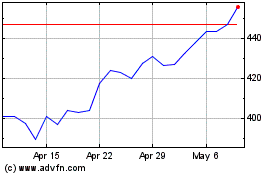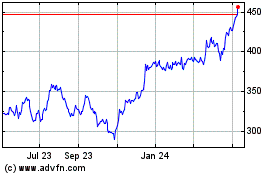By Liz Hoffman
NEW YORK -- Lloyd Blankfein secured the survival of Goldman
Sachs Group Inc. by leading it through the financial crisis. The
challenge for its next leader: how to thrive in a radically altered
postcrisis world.
The bank on Tuesday said David M. Solomon, Goldman's president
and chief operating officer, will take over as chief executive from
Mr. Blankfein. The move puts a symbolic cap on Goldman's postcrisis
era and will fuel the firm's continued evolution from a secretive
trading powerhouse into a more nimble and entrepreneurial
place.
In formally choosing Mr. Solomon, 56 years old, Goldman is
tapping a proven business-builder who has spoken forcefully about
the need for the firm to be less stuck in its ways. Neither a
sharp-elbowed trader nor genteel banker in the classic mold -- he
moonlights as a dance-club DJ -- he came to Goldman as a rare
outside partner in 1999 and has spent nearly his entire career
there in management jobs.
He has already been sketching out an agenda that would push the
firm to be more organized, decisive and open. Insiders expect him
to impose a corporate discipline that Goldman, which spent decades
as a loosely run partnership, has been slow to embrace. One of his
first moves, according to people familiar with the matter, is to
demand three-year operating budgets from Goldman's division
heads.
He has tipped to close associates that he is likely to prune
Goldman's storied management committee, whose membership has
swelled in the past decade, and refocus power among executives who
run businesses. He has built a strategy team to scout new business
ideas and acquisitions; pushed to include more women in the firm's
senior ranks; and is considering an investor day for 2019, lifting
the secrecy that once bolstered Goldman's mythic status but has
worn thin as profits shrank.
"Everything's on the table," Mr. Solomon has lately told top
executives.
Mr. Solomon became the heir apparent earlier this year, winning
a 15-month audition that pitted him against co-president Harvey
Schwartz, who resigned in March when the outcome became clear.
Tuesday's announcement formalizes that arrangement, setting Mr.
Solomon up to take control when Mr. Blankfein departs Sept. 30.
Under Mr. Blankfein, Goldman came to dominate Wall Street with a
mix of trading prowess and political clout. But it has struggled in
the world created by the financial crisis and is reaching to
unfamiliar areas such as consumer and commercial banking to replace
billions of dollars of trading profits that are unlikely to
return.
A combination of calm markets, tough regulation and changing
client behavior has wreaked havoc on securities desks across Wall
Street, hitting trading-heavy Goldman the hardest.
Its fixed-income division, which buys and sells corporate bonds,
oil, interest-rate swaps, among other things, once churned out $1
billion every 10 days or so. Last year, that took them an average
of 10 weeks.
In search of new profits, Goldman is making a belated push into
consumer banking and corporate cash management, hoping to challenge
Main Street giants such as JPMorgan Chase & Co. and Citigroup
Inc. on their turf. The firm aims to add $5 billion in annual
revenue by 2020 and is under pressure to show it can build new
business and hit targets.
In a first for Goldman, its succession saga has played out in
public view. It was a quick and undramatic transition when Mr.
Blankfein took over in 2006 from Henry M. Paulson Jr., who was
tapped as the Bush administration's Treasury secretary. Goldman was
still a private company when Mr. Paulson wrested control from Jon
Corzine in 1999. And for much of its history, power rested with its
partnership rather than a sole leader.
This time, Mr. Blankfein, 63, and the 56-year-old Mr. Solomon
have been working from neighboring glass-walled offices on the 41st
floor of Goldman's New York headquarters. Mr. Blankfein, who has
joked in the past that he intended to die at his desk, has seemed
at times ambivalent about handing over the reins.
At a meeting this spring of the firm's management committee, Mr.
Blankfein addressed news articles, including a March report in The
Wall Street Journal, that said he planned to step down later this
year.
"We're just going to have to deal with it for a little while,"
he said of the media attention, according to people briefed on his
remarks. Then the CEO addressed Mr. Solomon, who was dialing in
from Saudi Arabia, quipping: "But meanwhile, David, maybe you
should just stay over there."
Mr. Solomon came to Wall Street in the mid-1980s and spent his
early years in the mercenary world of junk debt. He played social
planner to a group of college friends, organizing ski trips to
Vermont and summer rentals in the Hamptons, where roommates would
wake up to find him mowing the lawn.
After stints at Salomon Brothers and Bear Stearns, he joined
Goldman as a partner -- it is unusual for an outsider to join at
that rank -- and set about building a junk-bond business. He then
ran its investment-banking division for a decade, turning it from a
loose collection of fiefs into a professionalized force that is the
largest on Wall Street by revenue.
Mr. Solomon had a strict policy of giving zero bonuses to the
bottom 5% of employees and aggressively clawed back stock from
bankers who left Goldman to start their own firms. He helped build
a corporate lending and debt-underwriting business -- a risky area
that Goldman, notoriously tightfisted on loans, had avoided in the
past -- that generated record revenues last year.
In 2012, he took over the planning of a West Coast conference
aimed at entrepreneurs that Goldman hoped could strengthen its ties
to promising startups.
Will McDonough, then a Goldman vice president, described an
early planning call. "David swoops in such as a general, barking
orders, assigning responsibilities," said Mr. McDonough, who is now
CEO of a blockchain business. "He saw the idea had legs and brought
this intense discipline to it. I remember being taken aback, but it
worked."
Today the Builders + Innovators Summit is a must-attend for
startup founders and venture capitalists and has become a
significant feeder for Goldman's investment-banking business.
Off duty, Mr. Solomon skis Aspen bowls and kite-surfs and spins
records in Baker's Bay, the Bahamas enclave where he has a home.
Under the stage name D-Sol, he recently released his first single,
a remix of the Fleetwood Mac song "Don't Stop," on the streaming
service Spotify. His third New York restaurant, Legacy Records,
recently opened on Manhattan's West side.
"A perpetual motion machine," said longtime friend and Hilton
Worldwide Holdings Inc. Chief Executive Christopher Nassetta.
Mr. Blankfein leaves Goldman on firmer footing than he found it,
though it took a near-death experience to get there. Goldman was at
the forefront of the derivatives-trading boom that sowed the seeds
of the financial crisis, and emerged browbeaten but intact, having
avoided the billion-dollar losses that hit rivals. Its relative
fortunes earned it a political lashing and cast Mr. Blankfein as a
central villain of the meltdown, an image he spent years trying to
shed.
He grew a beard and joined Twitter. Goldman has spent millions
of dollars sponsoring female entrepreneurs and small businesses, in
part aiming to rehabilitate its image and gain goodwill in
Washington. Earlier this year, it began streaming conversations
between its executives and celebrities and business leaders
including General Motors Co. Chief Executive Mary Barra and soccer
star David Beckham on Hulu.
Mr. Solomon wasn't the obvious choice to succeed Mr. Blankfein.
Goldman insiders gave the edge to Mr. Schwartz, who had followed in
Mr. Blankfein's footsteps through the firm's trading arm and spent
four years as its chief financial officer, learning the businesses
and dealing with investors and regulators. Throughout much of the
15 months they competed for the top job, Mr. Solomon told
associates he believed the job was Mr. Schwartz's to lose.
Mr. Solomon had previously considered leaving Goldman, but
turned down a chance to run Sheldon Adelson's casino empire in
2014, and later pursued a top job at private-equity firm TPG.
His patience paid off with one of the most coveted jobs in
finance. Despite Goldman's challenges, it remains a powerful symbol
on Wall Street, and the men who have run it -- the firm has never
had a female CEO -- are often looked to as a senior voice in the
industry.
Mr. Solomon has wasted no time rethinking some of the firm's
oldest traditions.
Big companies including JPMorgan and Walmart Inc. hold annual
"investor days," where shareholders and analysts get updates and
meet with executives. Goldman never has. Mr. Solomon has asked
executives to plan one, possibly as soon as next year, people
familiar with the matter said.
Goldman's division heads typically prepare annual budgets. Mr.
Solomon wants three years of revenue and cost projections, hiring
plans and client coverage initiatives, according to people familiar
with the matter.
He is also discussing changes to Goldman's powerful management
committee, according to people briefed on the matter. The group
meets weekly on Monday mornings and is a carry-over from Goldman's
days as a private firm, when a small group of partners set firm
strategy.
Over the past decade it has swelled from fewer than a dozen
executives, each running a major business line, to more than 30.
About one-third of its members don't oversee a revenue-producing
unit or region, and critics say Mr. Blankfein has used committee
seats more to soothe egos and send signals to underlings and
regulators than to run the firm's day-to-day affairs.
A Goldman spokesman declined to make Mr. Blankfein available for
comment.
Mr. Solomon has discussed paring the committee or creating a
smaller group of top managers that would meet separately, people
familiar with the matter said. Executives from nonrevenue divisions
such as human resources and legal might be shifted to a broader,
less-powerful operating committee.
That would echo a move Mr. Solomon made while running the
investment-banking division. Frustrated its leadership was too big
and lumbering, he created a smaller brain trust of top executives,
a move that bruised some egos but sped up decision-making.
And as discussions get under way about the selection of the 2018
partner class, Mr. Solomon has advocated for a smaller one --
almost certainly under 100 -- with a higher allotment of bankers,
traders and other revenue-generating employees and fewer slots for
functions including compliance and operations, according to people
familiar with the discussions.
Mr. Solomon has taken up diversity as an issue, particularly the
lack of women in senior roles at Goldman. The incoming class of
college graduates that will join Goldman this fall is 48% women,
and the firm has set a goal of parity by 2021.
He urged the promotion of Beth Hammack to become Goldman's
treasurer last fall over the objections of Mr. Blankfein, who felt
Ms. Hammack was more valuable on the trading floor, where she was
one of just a handful of senior women, according to people familiar
with the matter. Mr. Solomon argued her promotion would send a
message that Goldman was serious about closing the gender gap in
its upper ranks, the people said.
"We're at a point in time where 'enough already,' " he told
PayPal CEO Dan Schulman in a video chat last month. "I have trouble
talking to my daughters about this and explaining why, for so long,
we haven't made more progress on this front."
Write to Liz Hoffman at liz.hoffman@wsj.com
(END) Dow Jones Newswires
July 17, 2018 10:38 ET (14:38 GMT)
Copyright (c) 2018 Dow Jones & Company, Inc.
Goldman Sachs (NYSE:GS)
Historical Stock Chart
From Mar 2024 to Apr 2024

Goldman Sachs (NYSE:GS)
Historical Stock Chart
From Apr 2023 to Apr 2024
